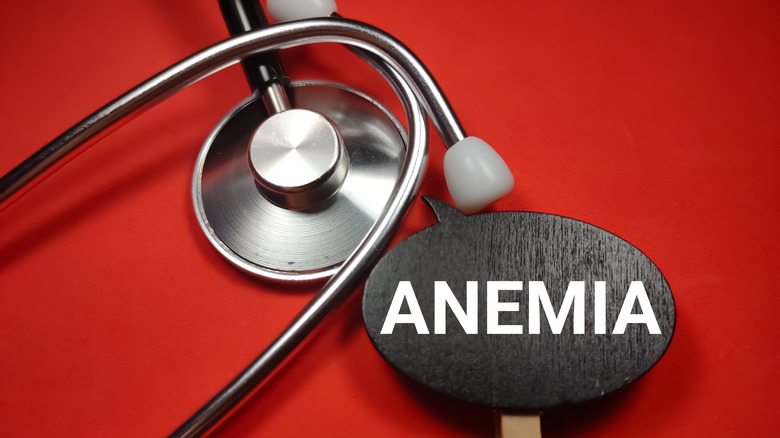The Surprising Connection Between Anemia And Your Weight
Anemia is a condition where there aren't enough functional red blood cells to transport oxygen to your body's tissues, according to the Cleveland Clinic. Anyone may become anemic, but some demographics are more prone to developing the condition than others. Menstruating people are at greater risk because of the blood loss they experience every month, particularly if they have heavy periods or fibroids. Additionally, those who are pregnant are vulnerable, especially following blood loss during childbirth. Babies transitioning from milk-based diets — whether formula or breast milk — to solid foods may consume less iron, making them more likely to have anemia. Similarly, toddlers, who require increased iron as they undergo growth spurts, may be at greater risk for the condition. Additionally, people over age 65 are more susceptible, especially if they're on blood thinners.
Symptoms of anemia can include fatigue, coldness, shortness of breath, headaches, dizziness, pale or easily bruised skin, restless legs, a fast heartbeat, and a sore tongue. Another symptom of anemia is problems with weight management, whether you're struggling to shed the extra pounds or maintain a healthy number on the scale.
How anemia can affect weight
Anemia can make weight management difficult because of several factors, depending on the type of anemia you're diagnosed with. Since anemia-related weight gain and weight loss are often correlated with lifestyle barriers, paying attention to cues like fatigue can help you and your healthcare provider identify the underlying cause of your anemia.
Livestrong says that iron deficiency anemia is common for women who are menstruating, pregnant, or undergoing childbirth. Another common type is vitamin deficiency anemia. According to Mayo Clinic, other types of anemia include aplastic anemia, thalassemia, and sickle cell anemia.
For all types, particularly iron and vitamin deficiency anemia, symptoms like fatigue and lack of energy can make it so that you don't have the stamina to work out. A lack of physical activity can lead to weight gain. Dr. Douglas P. Jeffery told Livestrong, "It's usually the effect anemia has on lifestyle that causes weight gain."
Because of the stress that a lack of oxygen can place on your organs, the process of burning fat can become more difficult, as well. With a lack of energy to exercise, weight gain can become compounded, and the goal of losing pounds can become impenetrable. On the flip side, vitamin deficiency anemia can be associated with unwanted weight loss and the inability to gain weight. The Cleveland Clinic states that you may lose weight along with being anemic if you have certain illnesses, for example, cancer.
How anemia is treated
If you or your child are anemic and unable to maintain a healthy weight, there are treatment options. Since there are multiple types of anemia, consulting with your healthcare provider for a proper diagnosis is the first step. Luckily, there are many treatment options for the various types of anemia, particularly regarding weight management.
Anemia that is caused by a nutrient deficiency may be treated by supplementation. A 2014 study published in La Clinica Terapeutica found that taking oral iron supplements to combat iron deficiency anemia resulted in the waist circumference and overall weights of participants being decreased after six months of treatment. Additionally, their metabolic rates improved, and their high-density lipoprotein (HDL), otherwise known as the good kind of cholesterol, was increased. Levels of triglycerides, another type of blood lipid, were decreased. Similarly, anemia caused by vitamin deficiencies can be treated by taking supplements or injections of the deficient vitamin (via Mayo Clinic).
Other forms of anemia may require more extensive treatments. According to Mayo Clinic, hemolytic anemia is treated by taking medication to combat red blood cell-fighting factors within your immune system and by removing medications that could be causing the condition. For sickle cell anemia, pain relievers may be prescribed alongside treatments, including blood transfusions, fluids, and oxygen. A medication called hydroxyurea, typically used to treat cancer, has also been effective in treating sickle cell anemia. With proper treatment, healthy weight management may be achieved.



